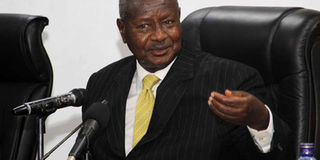Why prospects for change in Uganda through February polls are minimal

Uganda President Yoweri Museveni speaks at the end of talks between Burundi's rival political factions in Bujumbura on July 15, 2015. Analysts and opinion polls say President Museveni is in the lead and appears to be particularly popular amongst rural voters and women. FILE PHOTO | AFP
What you need to know:
- Clearly some support the incumbent because they believe he has helped foster peace and stability, and because of the various development projects he has initiated.
- A poll conducted earlier in 2015 suggested that the majority of Ugandans do not believe that it is possible to have a transfer of power through the ballot box.
- They need to persuade voters that they would do a better job; maintain stability, tackle corruption, create jobs, improve health care and education, facilitate development, and so forth.
In just under a month, Uganda will hold presidential and parliamentary elections.
There are eight presidential candidates in all, but there are only three that people are talking about: the incumbent President Yoweri Museveni of the National Resistance Movement (NRM), the stalwart opposition leader Kizza Besigye of the Forum for Democratic Change (FDC), and the recent NRM insider and Go Forward candidate Amama Mbabazi.
Analysts and opinion polls say President Museveni is in the lead and appears to be particularly popular amongst rural voters and women. But why?
Clearly some support the incumbent because they believe he has helped foster peace and stability, and because of the various development projects he has initiated.
Many women also applaud his role in increasing female representation.
At the same time, many are unsure of how his opponents would perform if in power.
While such evaluations are important, a closer look shows many citizens are also incredibly cynical.
Since independence, Ugandans have never experienced a turnover of power through the ballot box, and many question why February’s poll will be any different.
According to a nationally representative survey that the author helped design, and which was carried out in December, a majority of Ugandans believe that the 2011 election was either not free and fair, or that it suffered from major problems.
ONEROUS TASK
Moreover, a poll conducted earlier in 2015 suggested that the majority of Ugandans do not believe that it is possible to have a transfer of power through the ballot box; while it is clear that people have little confidence in the country’s electoral commission.
At the same time, President Museveni and the NRM are spending a lot of money on their campaigns – with many arguing that expenditure is even higher than 2011 when excess spending helped fuel inflation and deplete state coffers.
There is also ongoing intimidation. As in 2006 and 2011, multiparty campaigns have seen politicians arrested, supporters tear gassed and journalists beaten.
At the same time, there has been a localisation of intimidation as many observers report an NRM campaign that promises development if communities support the party’s candidates, but simultaneously threatens that projects will be denied if an area votes for the opposition.
A Ugandan version of President Moi’s infamous saying: siasa mbaya, maisha mbaya (bad politics, bad life).
Together with people’s scepticism of the possibility of change, threat of punishment for a pro-opposition vote provides an understandable incentive for many either not to vote or to vote for the NRM.
In this context, opposition candidates have a difficult job ahead.
They need to persuade voters that they would do a better job; maintain stability, tackle corruption, create jobs, improve health care and education, facilitate development, and so forth.
They also need to persuade the more cynical voters that the opposition can win, and that there is a point in voting for them.
This is a need of which the opposition candidates are fully aware.
WANING PUBLIC TRUST
In response, Amama Mbabazi has drawn upon his recent status as an NRM insider to claim that he knows how elections have been rigged in the past, and is ready to tackle it.
This message is reinforced by various rumours, for example, that Mbabazi is in possession of sophisticated election software that can thwart any efforts at electoral malpractice.
In turn, the FDC has asked their supporters to protect their vote.
The message is that people should not only turn out to vote, but that they should stay at the polling station until the votes are counted to ensure their votes are not stolen.
Whether such arguments and safeguards will persuade voters and protect the vote is yet to be seen.
What is clear is that opposition candidates are still fighting. It is also clear that their approach reinforces a lack of confidence in the electoral process.
The implication is that, even if President Museveni wins, he will face a number of challenges – not only because of the medium-term economic implications of excess spending during the campaigns, but also because of the lack of trust that Ugandans have in their political systems.
Gabrielle Lynch is an Associate Professor of Comparative Politics, University of Warwick, UK. [email protected];




